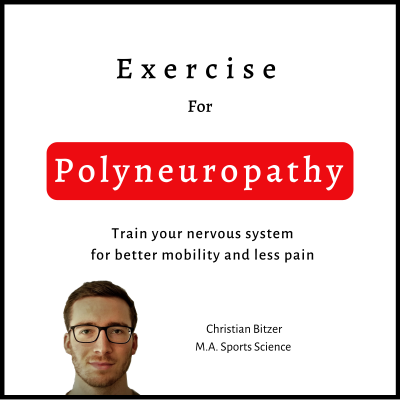Diet can help with polyneuropathy
The right diet for polyneuropathy can make all the difference.
However, this is easier said than done, because the diet must fit you personally and your polyneuropathy.
If the nerve damage is caused by diabetes, for example, a different diet is obviously required than if, for example, chemotherapy has triggered the polyneuropathy.
Not everything is the same for everyone.
However, there are also things that do not help, or only help under certain circumstances. This article is designed to help you choose the right diet and supplements for polyneuropathy.

Foods that can help with polyneuropathy
Omega-3 fatty acids protect against polyneuropathy caused by chemotherapy
Omega-3 fatty acids can be helpful with chemotherapy - in some circumstances.
Omega-3 fatty acids showed a preventive effect in patients receiving chemotherapy. Patients who received omega-3 fatty acids during chemotherapy were less likely to develop symptoms of polyneuropathy.
However, from the studies I know, this is only proven for chemotherapy with bortezomib and paclitaxel. It is not yet clear whether omega-3 fatty acids help with other chemotherapies.
An example study with bortezomib can be found here.
An example study with paclitaxel can be found here.
However, the few studies that are available on the subject are only positive indications and not sufficient justification to give omega-3 fatty acids in principle to every patient undergoing chemotherapy. If you are receiving chemotherapy, be sure to talk to your doctor about the issue before taking supplements on your own. Under certain circumstances, these can interact with the drugs or impair their effect.
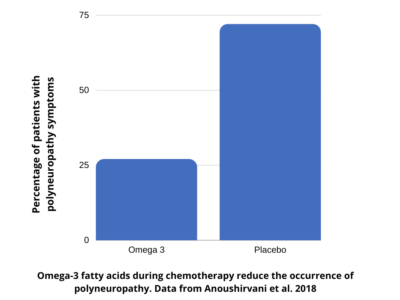
Specific exercises can also help with polyneuropathy - you just have to know which ones!
You can find exercises to do at home and the most important information here:
Omega 3 fatty acids might help with diabetic polyneuropathy
It has long been known that omega-3 fatty acids help protect blood vessels in disease and thus maintain better blood flow.
This may also benefit diabetics suffering from polyneuropathy. This is because in many diabetics, the smallest blood vessels that supply the nerves are damaged, which can cause polyneuropathy.
Some small studies showed improvement in polyneuropathy symptoms with omega-3 fatty acid intake in diabetic patients. Here is an example study.
It is therefore quite probable that taking of omega-3 fatty acids at least slows down the progression of polyneuropathy.
The blood sugar level is crucial
If you suffer from diabetes, the first goal of the diet is, of course, to reduce blood sugar levels. This is the best protection for the nerves. Eating additional foods is only a supplement and should not be the main focus.
Proper exercise can also help reduce blood sugar permanently. With my "sugar training" I would like to make your training as easy and time-saving as possible. You can find more info at the following link (in German):
Almost only positive side effects to be expected
Omega-3 fatty acids are now universally recognized as beneficial to health.
Those who consume a lot of omega-3 fatty acids protect themselves from a variety of diseases, especially heart attacks and strokes.
Therefore, you can safely take them without fear of the side effects. Nevertheless, if you suffer from a disease such as cancer, it is always recommended to at least inform the doctor. This is particularly true in the case of chemotherapies.
Also, only positive side effects can be expected from targeted exercises. Sample exercises can be found here:
Only the right omega-3 fatty acids help with polyneuropathy
Unfortunately, not all omega-3 fatty acids are created equal.
Unfortunately, the alpha-linolenic acid contained in many vegetable oils hardly helps against polyneuropathy. The docosahexaenoic acid and eicosapentaenoic acid contained in oil from algea or fish oil, on the other hand, are more helpful. Therefore, I recommend algea oil oily deep-sea fish oil, especially in capsules or liquid.
Since you can't eat fish every day, but a daily intake of fish oils is necessary to slow down polyneuropathy, it simply makes the most sense to take algea or fish oil as capsules or luquid. Since, due to the studies available so far, it is not yet possible to make a reliable statement on dosage, I recommend that you follow the manufacturer's instructions for the respective products.
When choosing a product, please consider the environment, too. This is why I personally prefer algae products over fish.
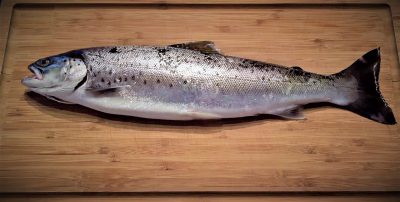
Optimal dosage of omega-3 fatty acids is not yet known
However, it is not yet known what amount of omega-3 fatty acids is optimal for polyneuropathy.
The few studies on the subject have used different dosages and more research is needed to clarify this issue.
Until there is more reliable data on this, it is therefore recommended to stick to the manufacturer's specifications.
Diet that inhibits inflammation can be helpful
In many forms of polyneuropathy, inflammatory processes are involved in the damage to the nerves. This is particularly the case in Guillain-Barré syndrome and chronic inflammatory demyelinating polyneuropathy, but inflammation also plays a role in other forms of polyneuropathy (e.g., diabetic polyneuropathy).
Diet can have an impact on how prone one is to inflammation and also on how intense the chronic inflammation gets. Therefore, it is believed that the severity of polyneuropathy depends to some degree on whether one's dietary choices promote or tend to inhibit inflammation. Foods that inhibit inflammation and therefore should be consumed frequently are:
- Nuts, fish, berries and vegetables, especially onions.
- Olive and flaxseed oil
- Spices such as lovage, turmeric, oregano and basil, among others.
- Tea from chamomile, sage or green tea. In particular chamomile tea has a pretty strong effect.
Foods that tend to promote inflammation and should therefore be avoided are:
- Beef and pork
- Sugar and white flour products such as white bread
- Sunflower oil
- Alcohol
Incidentally, a diet that is anti-inflammatory is beneficial to health apart from polyneuropathy and can be helpful for all other forms of inflammation. It can therefore be helpful for joint pain, for example, and reduce the risk of heart attacks and strokes.
Vitamin D can help - if there is a deficiency
Vitamin D is the one vitamin that many people are deficient in and currently probably one of the most popular supplements. It helps make bones stronger, keeps blood vessels fit, and probably protects against autoimmune diseases and possibly even cancer.
That's why millions of people now take it as a pill or drops, which is generally a good idea because it's the vitamin that's most difficult to get from food. It is often mentioned as the only vitamin that everyone should take as a supplement. According to the Robert Koch Institute, 56% of people in Germany have too little vitamin D(RKI).
It also plays a role in nutrition in polyneuropathy: people with low levels of vitamin D are more likely to develop polyneuropathy, according to some studies. For example, those who suffer from diabetes and also have too little vitamin D are at increased risk of nerve damage and polyneuropathy.
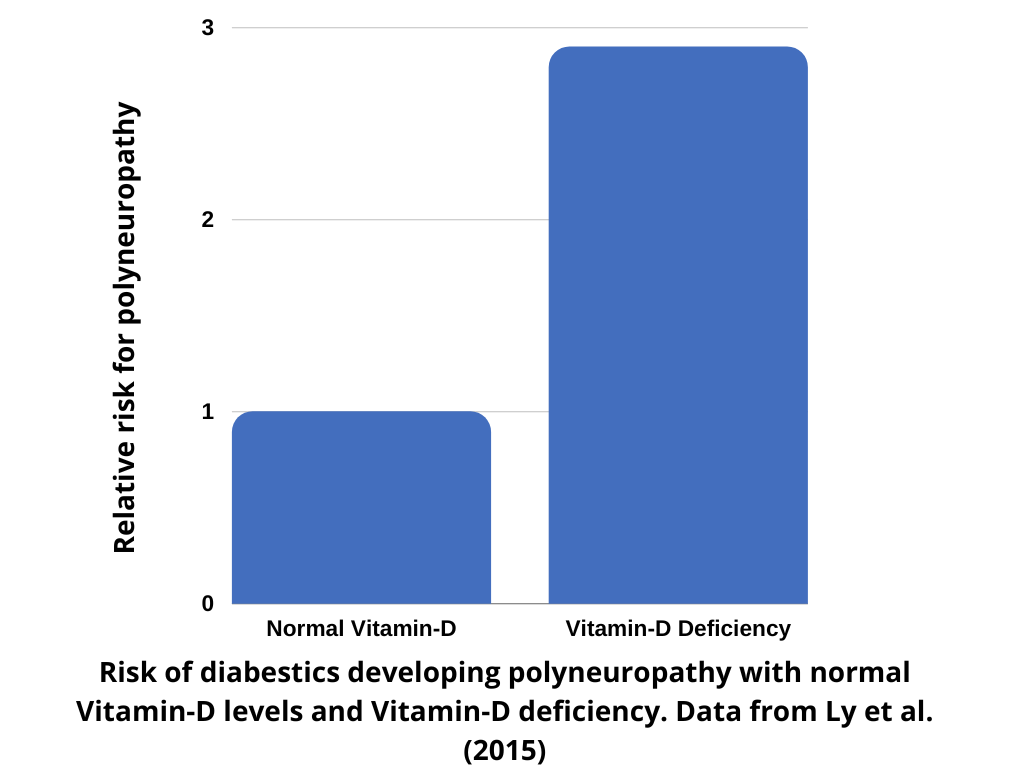
Compensating for vitamin D deficiency may improve polyneuropathy
It has already been tried whether polyneuropathy improves when an existing deficiency of vitamin D is compensated.
In a randomized controlled trial, patients suffering from polyneuropathy due to diabetes who had such a deficiency were injected with vitamin D. This brought the subjects to normal blood levels of vitamin D.
Patients showed significant improvements in pain over the following weeks and were also better able to maintain balance.
(You can read the whole study here).
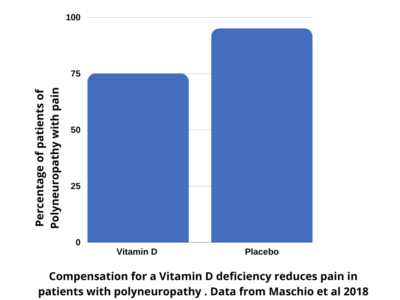
Huge quantities are of no use
Based on such results, it has been tried whether polyneuropathy can be cured by taking huge amounts of vitamin D.
Unfortunately, to my knowledge, all of these attempts have not been successful. So the rule that applies to all vitamins also applies here:
Taking more vitamins than your daily need is not beneficial but may be harmful!
Some of my patients have tried injections with very large amounts of vitamin D to improve polyneuropathy (altough I did not recommend this). While doing so, they had to adhere to rigorous dietary rules in order to control the side effects of high-doses of vitamin D. In the cases I know of, however, these attempts have never been successful.
I therefore do not recommend trying this yourself. Take vitamin D in normal dosages to make up for a deficiency. Anything else is of no use and is even dangerous.
In the case of vitamin D and polyneuropathy, it is better to measure instead of just guessing how much you should take.
So if you suffer from polyneuropathy, it may make sense to take extra vitamin D as a supplement.
However, you should have it measured beforehand to see if there actually is a deficiency. Because if you already have enough vitamin D, it is not beneficial to take even more.
The vitamin D level in the blood is now measured by many doctors. Just ask.
Alpha lipoic acid for supplementation in polyneuropathy
Another promising dietary supplement is alpha lipoic acid.
It also seems to protect the nerves somewhat, and in some patients it even leads to a significant improvement in the symptoms of polyneuropathy.
In scientific studies, however, this has only been investigated in diabetic polyneuropathy. In those studies, a strong effect was found only when the alpha lipoic acid was given as an infusion. However, I think it is quite likely that alpha lipoic acid in capsules also has some effect when taken over a longer period of time.
For a detailed assessment from the Journal of the American Family Physician, click here.
Do not overdose alpha lipoic acid!
Side effects of alpha lipoic acid overdose
Alpha lipoic acid is also helpful only if you don't overdo it.
Taking too much alpha lipoic acid causes dizziness, nausea and vomiting.
Per day you can usually take 600 mg in capsules.
Discuss alpha lipoic acid with your doctor
However, if want to take alpha lipoic acid as a capsule, you should talk to a doctor first.
This is because it may interact with some medications. This is especially true in the case of chemotherapy.
B vitamins only help when there is actually a deficiency!
Those suffering from vitamin B deficiency can develop polyneuropathy as a result. In such cases, it is of course essential to compensate for this deficiency in order to stop the disease.
It is therefore useful to check for symptoms of polyneuropathy to see if such a deficiency is present.
If you don't have a vitamin deficiency, you don't need extra vitamins!
It is an obvious thought to take the important B vitamins to treat polyneuropathy, even if it is not caused by vitamin deficiency.
Unfortunately, this assumption has not been confirmed. Doing so does not improve polyneuropathy. With vitamins, as with all nutrients:
Taking more than you need is not beneficial.
That is, if you do not have a vitamin B deficiency, you do not need to take additional supplements.
B vitamins are most likely to help polyneuropathy caused by alcohol
When a polyneuropathy is caused by alcohol, the chances of improving the polyneuropathy with B vitamins are still the greatest.
Because one of the reasons you develop polyneuropathy from alcohol is that the alcohol deprives you of these important vitamins, causing deficiencies.
However, in polyneuropathy of other causes, the chances of B vitamins helping you are poor.
Copper deficiency can also cause nerve damage
Copper, as a trace element, participates in the normal functioning of our body. Normally, people have enough of it with a normal diet and do not have to worry about it. Reasons for a lack of copper can be surgery on the gastrointestinal tract. Gastric bypass surgery, in particular, can result in insufficient copper absorption and the development of long-term polyneuropathy. Copper deficiency may also occur in some diseases of the digestive system. For example, in celiac disease.
Also, a large intake of zinc may result in insufficient copper being absorbed. Because when large amounts of zinc are in the digestive system, they prevent copper absorption. So, as with all other nutrients, one should not overdo the additional intake of zinc in the form of pills.
If you suffer from a chronic disease of the digestive system, or have consumed large amounts of zinc over a long period of time, it is therefore useful to have your copper levels checked.
Creatine unfortunately does not help
Creatine has long been used as a dietary supplement for athletes. It also has positive effects in some nerve diseases such as amyotrophic lateral sclerosis. Therefore, it was suspected that it could also help with polyneuropathy.
However, studies comparing creatine with placebos showed no positive effect. In these studies, patients with polyneuropathy performed strength training and ingested either creatine or the placebo. The training did result in increased muscle strength, but creatine did not provide any additional benefit. (You can read two of the studies here: Chetlin et al. 2004; Doherty et al. 2001).
At least these studies show, however, that with the right training you can build strength despite polyneuropathy.
What to avoid with polyneuropathy
Avoid alcohol, because it damages nerves and leads to vitamin deficiency
Anyone suffering from polyneuropathy should avoid alcohol as much as possible - at least in larger quantities.
Alcohol not only damages the nerve cells directly, it can also lead to a deficiency of B vitamins, which can aggravate or trigger polyneuropathy.
If, on the other hand, you like to drink beer, it may make sense to drink non-alcoholic Weißbier. It contains B vitamins, so the beer can contribute to a healthy supply of them. However, as I said it is not beneficial to take it in large quantities. Normal quantities that cover the normal needs are enough.
Avoid extreme nutrition!
Vegan diet is risky in polyneuropathy
Vegan nutrition is in fashion right now and some people claim it is the cure for anything. It is sometimes also recommended for polyneuropathy. However, I do not advise this.
The vegan diet is relatively often deficient in B vitamins. This is, of course, absolutely to be avoided in polyneuropathy and can lead to a significant worsening of symptoms.
With a normal, non-vegan diet, on the other hand, you automatically consume enough B vitamins. If you still want to eat a vegan diet, you should therefore plan this carefully and be sure to consult with a nutritionist or doctor.
Gluten-free diet is also risky
Gluten-free diets are also becoming increasingly popular. Gluten can actually cause polyneuropathy in people with gluten intolerance. These patients must then, of course, adhere strictly to a gluten-free diet. However, if you do not suffer from celiac disease or medically diagnosed gluten hypersensitivity, you should avoid this type of diet. Gluten is then no problem for you and does not cause problems for the nerves. If this is the case, a gluten-free diet will only make it morre difficult for you to eat healthy, without gaining any benefit from it. There are also cases where the gluten-free diet resulted in vitamin B deficiency, which then caused polyneuropathy. So if you tolerate gluten, stick to your normal diet.
Avoid low salt diet
In many places, it is recommended to eat a low-salt diet. This often actually doses make sense. In polyneuropathy, however, there is a risk of harming yourself with it. At least in animal studies, a high-salt diet even showed protection against polyneuropathy (Here's the study). The same was shown in an epidemiological study(here the link) of the association of dietary habits and Chronic Axonal Polyneuropathy. Those who consumed less than 6 grams of salt a day had an increased risk of developing this form of polyneuropathy.
This is not enough evidence to apply extra salt in your diet. However, it is an indication that salt should not be avoided either. So here too, just eat normally.
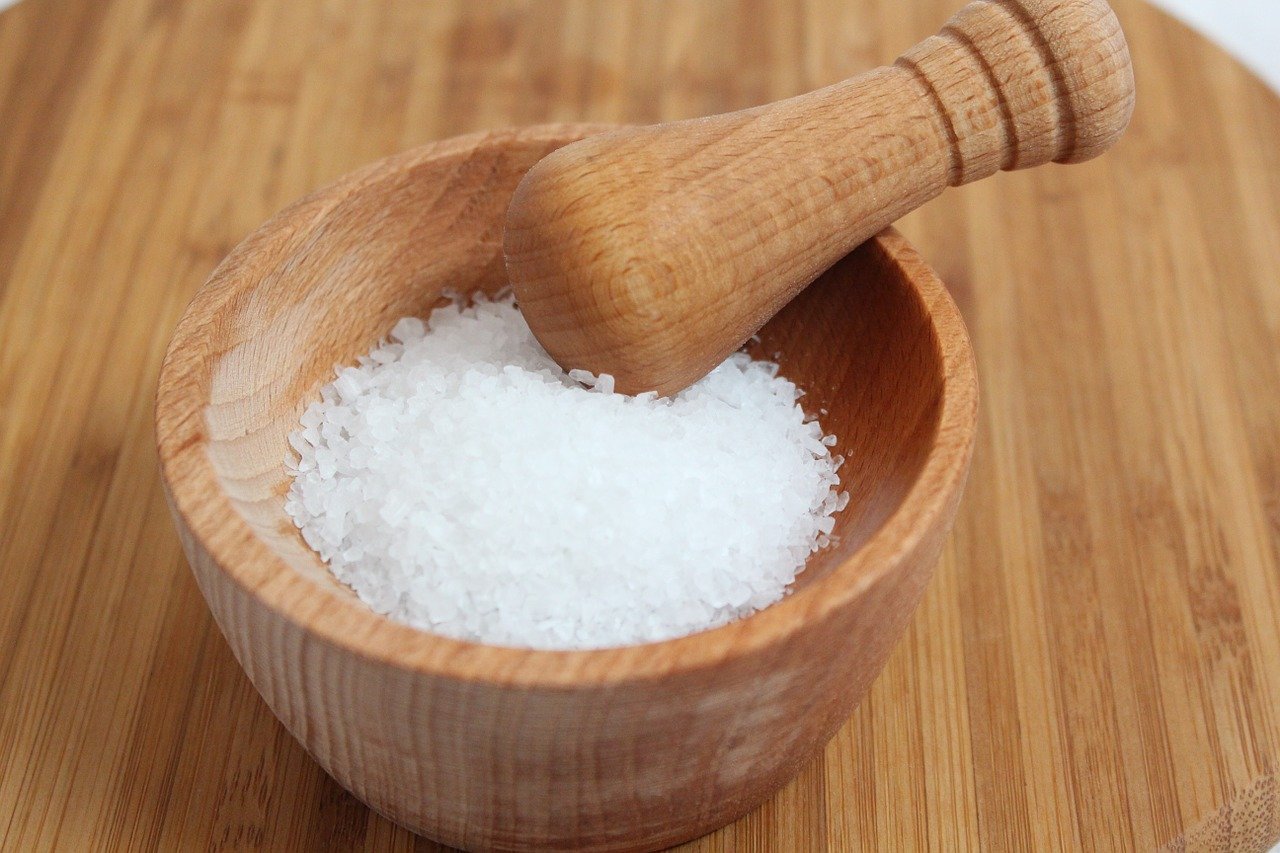
Therapeutic fasting can be useful for diabetics
If you have type 2 diabetes, therapeutic fasting is a way to regulate your blood sugar levels and lose weight, which helps reduce blood sugar in the long run. This can lead to slowing down or even stopping the progression of polyneuropathy by significantly improving diabetes.
It is important to do strength training while you are fasting. If one do not train, your body uses the proteins from the muscles to produce energy. So you lose muscle mass and strength, which later makes diabetes worse.
Therefore, therapeutic fasting in polyneuropathy should definitely be supervised by professionals who, in particular, also provide the right exercise recommendations.
Be cautious about fasting during chemotherapy
There have been some reports about positive effects of therapeutic fasting in cancer treatment. There may even be a positive effect on polyneuropathy caused by chemotherapy.
However fasting during chemotherapy should be approached with great caution. What few people know is that malnutrition is a common problem in cancer patients, and too little food further weakens their bodies during cancer treatment and chemotherapy.
In fact, in many cases it is better to eat as much as possible and try to gain weight. Therapeutic fasting should therefore only be done with medical supervision if you suffer from cancer.
Therapeutic fasting for polyneuropathy
There is now some scientific data showing that therapeutic fasting can have a positive effect on the nervous system. There are studies that reported improved memory after fasting - even with people with early stages of dementia.
Therefore, it is suspected that therapeutic fasting could also have positive effects on the nerves and thus help with polyneuropathy. However there are currently no scientific studies in patients with polyneuropathy to confirm this. However, there are studies in which it has been observed that therapeutic fasting at least positively influences the health of the peripheral nervous system (Lee & Notterpeck 2012). Positive effects on the progression of polyneuropathy have also been observed in animal studies (Madorsky et al. 2009).
Whether polyneuropathy actually improves through therapeutic fasting is therefore not completely known yet . If you want to try it yourself, however, you should be aware of certain aspects:
Therapeutic fasting should not be done if you are underweight. In addition, it is essential to do strength training during the fasting to prevent muscle loss. Exercises for this can be found here: Sport for polyneuropathy, Exercise for polyneuropathy
If there is already signifiant muscle loss due to polyneuropathy, therapeutic fasting should be avoided in order not to lose even more muscle.
Deficiencies of vitamins and trace elements should be avoided in order not to aggravate polyneuropathy. If you suffer from a serious illness, you should fast only with professional support.
Giving up coffee is not necessary
It is a common claim that patients with polyneruopathy should give up coffee.
However, there is no reliable evidence to support this claim. On the contrary, coffee is actually healthy in moderate quantities. If polyneuropathy is caused by diabetes, coffee can even help lower blood sugar levels. So, in this case, coffee can even slow down the worsening of nerve damage.
If you like to drink coffee, you can continue to do so.
If you want to know more about coffee and polyneuropathy, you can find a complete article on coffee and polyneuropathy here.
Acetyl-L-carnitine seems to help during some chemotherapies
Not all polyneuropathies are the same, and not all chemotherapy is the same. In order to prevent polyneuropathy during chemotherapy, what you should do depends on what chemotherapy exactly you are getting.
Positive effects have been observed for acetyl-L-carnitine during certain chemotherapies. However, this seems to be the case only for chemotherapies with active ingredients from platinum derivatives (e.g., cisplatin or carboplatin). No beneficial effect was observed with other chemotherapies, e.g. taxanes (e.g. paclitaxel or docetaxel). So you see that nutritional supplements during chemotherapy are a very complex thing to discuss with your doctor. A scientific review of acetyl-L-carnitine can be found at the following link: Dinicola (2018)
Nutrition is not a miracle cure, but it can help
Unfortunately, there is no such thing as "the diet for polyneuropathy." However, there definitely are thinds to be avoided. For most things, it's a good idea to consult with experts.
Especially for people suffering from polyneuropathy due to diabetes or vitamin deficiensies, the right diet has great potential for improving or at least putting the brakes on polyneuropathy.
For everyone else, the key is to avoid dietary errors as a polyneuropathy patient rather than to eat a particular food in large quantities.
In a nutshell: The dos and don'ts of nutrition in polyneuropathy
What you should add
Omega-3 fatty acids from fish oil
Vitamin D (ideally, after your levels have been measured).
Alpha Lipoic Acid
Provided that a deficiency has been detected:
Copper and vitamin B
What you should avoid
Alcohol should never be consumed in large quantities if you have nerve damage.
If your polyneuropathy is due to diabetes, you should of course avoid sugar and carbohydrates.
All extreme diets are risky and should be avoided.
This applies in particular to:
Extremely low salt diet
Vegan diet
Gluten-free diet (Unless there is a medical reason to do so).
Therapeutic fasting may be useful for polyneuropathy in some circumstances, especially if diabetes is the cause of the nerve damage. However, it should be discussed with professionals first. Especially if your polyneuropathy is due to chemotherapy, it is necessary to consult with a doctor first.
By the way, you can safely continue to drink coffee.
